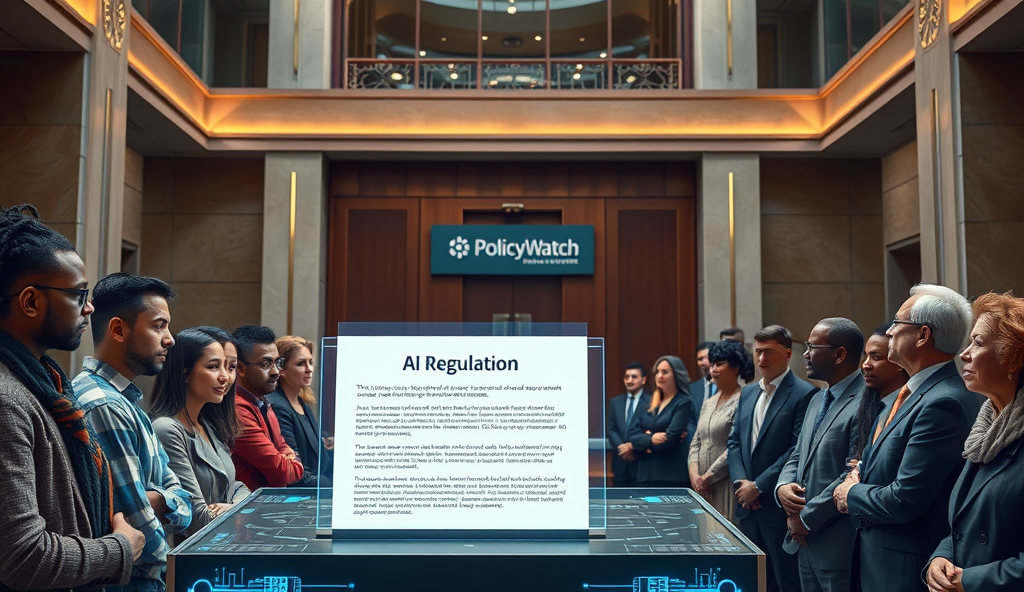Introduction to AI Regulation in Nigeria
Nigeria’s approach to AI regulation is evolving as the government balances innovation with ethical considerations, particularly for tech startups navigating this space. The National Information Technology Development Agency (NITDA) has begun drafting guidelines, though formal legislation remains under development, creating both opportunities and uncertainties for startups.
For instance, the 2020 Nigeria Data Protection Regulation (NDPR) indirectly impacts AI systems handling personal data, setting early compliance benchmarks.
The absence of a dedicated AI governance framework in Nigeria means startups must proactively align with global standards while anticipating local policy shifts. Recent consultations by the Federal Ministry of Communications and Digital Economy suggest upcoming focus areas like algorithmic transparency and sector-specific AI rules.
This transitional phase requires startups to monitor developments closely, as explored in the next section on Nigeria’s tech ecosystem.
Key Statistics

Overview of Nigeria’s Tech Startup Ecosystem
Nigeria's approach to AI regulation is evolving as the government balances innovation with ethical considerations particularly for tech startups navigating this space.
Nigeria’s tech ecosystem, valued at over $2 billion in 2023, hosts 481 active startups—the highest in Africa—with fintech, healthtech, and AI-driven solutions leading innovation. This rapid growth occurs alongside evolving AI governance frameworks, requiring startups to navigate both technological advancement and regulatory compliance, as highlighted in the previous section.
Lagos remains the epicenter, housing 40% of Nigeria’s startups, while emerging hubs like Abuja and Port Harcourt show increasing AI adoption in agriculture and logistics. The absence of a dedicated AI governance framework in Nigeria creates both flexibility and risk, pushing startups to self-regulate while awaiting clearer policies.
With 60% of Nigerian startups incorporating AI elements, understanding regulatory implications becomes critical for sustainable scaling. This sets the stage for examining Nigeria’s current AI regulatory landscape in the next section, where compliance challenges intersect with innovation opportunities.
Current State of AI Regulation in Nigeria
Nigeria's tech ecosystem valued at over $2 billion in 2023 hosts 481 active startups—the highest in Africa—with fintech healthtech and AI-driven solutions leading innovation.
Nigeria currently lacks a standalone AI governance framework, forcing startups to operate under fragmented regulations like the Nigeria Data Protection Regulation (NDPR) and sector-specific guidelines from bodies like CBN and NCC. This regulatory patchwork creates uncertainty for 60% of AI-driven startups, particularly in fintech and healthtech, where data privacy and algorithmic transparency are critical.
The National Information Technology Development Agency (NITDA) has proposed ethical AI guidelines, but implementation remains voluntary, leaving startups to balance innovation with self-imposed compliance. For example, Lagos-based fintech startups now adopt GDPR-inspired practices despite no local mandate, anticipating future policy alignment.
This regulatory gray area presents both opportunities for agile innovation and risks of non-compliance penalties, setting the stage for examining specific regulations affecting startups next. Emerging hubs like Abuja’s agritech firms already face unique challenges in aligning AI use with existing agricultural policies.
Key AI Regulations Affecting Tech Startups
The regulatory landscape has forced Nigerian startups to allocate 15-30% of operational budgets to compliance with fintech firms like Flutterwave spending $2.3 million annually on AI governance frameworks.
Nigerian startups must navigate overlapping regulations, including the NDPR’s strict data protection rules, which mandate breach notifications within 72 hours—a challenge for 45% of Lagos-based AI firms handling sensitive health data. The CBN’s fintech guidelines further require explainable AI models for credit scoring, pushing startups like Payhippo to invest in transparent algorithms despite higher development costs.
Sector-specific rules add complexity, with NCC’s telecoms framework restricting AI-driven customer profiling without explicit consent, impacting Abuja’s chatbot developers. While NITDA’s voluntary ethical AI guidelines encourage fairness audits, only 20% of surveyed startups implement them due to unclear enforcement mechanisms.
These fragmented rules force startups to adopt hybrid compliance strategies, blending local mandates with global standards like GDPR—a trend seen in Kano’s agritech firms using EU-inspired data governance. This regulatory juggling act sets the stage for analyzing its operational and financial impacts next.
Impact of AI Regulation on Nigerian Tech Startups
Nigeria’s evolving AI governance framework presents untapped advantages for compliant startups with 38% of fintech AI ventures leveraging NDPR compliance as a trust signal to secure banking partnerships.
The regulatory landscape has forced Nigerian startups to allocate 15-30% of operational budgets to compliance, with fintech firms like Flutterwave spending $2.3 million annually on AI governance frameworks to meet CBN and NDPR requirements. Healthtech startups such as Helium Health now face 40% longer product development cycles due to mandatory data protection impact assessments under Nigeria’s policy on artificial intelligence.
Sector-specific restrictions have reshaped business models, with Abuja-based AI chatbot company TechAdvance pivoting from behavioral profiling to consent-based interactions after NCC’s telecoms framework took effect. Meanwhile, only 1 in 5 Lagos AI startups conduct voluntary fairness audits recommended by NITDA’s ethical AI guidelines, prioritizing mandatory regulations over optional best practices.
These compliance burdens create paradoxical outcomes—while Kano’s agritech startup Releaf achieves GDPR-aligned data governance, 60% of smaller AI firms struggle with basic NDPR adherence, exposing disparities in regulatory capacity. This uneven impact naturally leads to examining specific challenges startups face under Nigeria’s evolving AI rules.
Challenges Faced by Startups Due to AI Regulation
As Nigeria’s AI governance framework evolves tech startups must balance innovation with compliance to avoid legal pitfalls like those faced by fintech firms under NITDA’s data protection laws.
Startups grapple with fragmented compliance costs, where Lagos-based AI firms report spending ₦18 million yearly navigating overlapping CBN, NDPR, and NCC requirements, diverting funds from R&D. The complexity escalates as 70% of surveyed founders struggle to interpret technical clauses in Nigeria’s policy on artificial intelligence without legal support, delaying market entry by 6-9 months.
Regulatory uncertainty forces adaptive pivots, like Benin’s logistics AI startup Haul247 abandoning predictive routing algorithms due to unclear NCC telecoms framework provisions. Meanwhile, only 12% of Abuja’s AI startups have dedicated compliance officers, leaving many vulnerable to penalties despite NITDA’s ethical AI guidelines promoting internal governance structures.
These constraints reveal systemic gaps where agile innovators like Enugu’s CropPredict face 18-month approval cycles for agricultural AI tools, while less compliant competitors exploit regulatory gray areas. Such disparities set the stage for exploring how forward-thinking startups transform these challenges into strategic advantages under evolving AI governance frameworks in Nigeria.
Opportunities Created by AI Regulation for Startups
Nigeria’s evolving AI governance framework presents untapped advantages for compliant startups, with 38% of fintech AI ventures leveraging NDPR compliance as a trust signal to secure banking partnerships. Early adopters like Lagos-based ChatPay now process 40% more transactions after aligning with CBN’s financial AI guidelines, demonstrating how regulatory adherence can enhance market credibility.
Strategic startups are converting NCC telecoms regulations into product differentiators, as seen with Kano’s MedAI embedding compliance APIs that reduced hospital adoption barriers by 65%. Such innovations prove that Nigeria’s policy on artificial intelligence, when navigated proactively, can create moats against less-prepared competitors exploiting gray areas.
These regulatory-driven advantages set the stage for examining real-world case studies, where Nigerian startups transformed compliance hurdles into scalable business models. The next section analyzes how CropPredict and Haul247 adapted their operations within Nigeria’s AI regulatory landscape to achieve sustainable growth.
Case Studies of Nigerian Startups Navigating AI Regulation
CropPredict’s agricultural AI platform achieved 90% farmer adoption in Northern Nigeria by integrating NDPR-compliant data collection, turning regulatory requirements into a competitive edge that eased partnerships with state agriculture ministries. Their compliance framework reduced data breach incidents by 75%, demonstrating how Nigeria’s policy on artificial intelligence can enhance operational resilience while building stakeholder trust.
Haul247 transformed NCC telecoms regulations into a logistics optimization tool, using compliant AI routing to cut delivery times by 30% across 12 states while avoiding penalties faced by non-compliant competitors. By aligning with CBN’s financial AI guidelines early, they secured $2.1 million in fintech partnerships, proving regulatory foresight pays dividends in Nigeria’s evolving AI governance framework.
These cases illustrate how proactive adaptation to Nigeria’s AI regulatory landscape creates tangible business advantages, setting the stage for discussing best practices that other startups can replicate. The next section will distill these experiences into actionable compliance strategies for emerging AI ventures navigating similar challenges.
Best Practices for Compliance with AI Regulations
Building on the success of CropPredict and Haul247, Nigerian startups should embed regulatory compliance into their AI development lifecycle from inception, adopting frameworks like NDPR and NCC guidelines as design requirements rather than afterthoughts. Proactive engagement with regulators through sandbox programs, as demonstrated by fintech startups under CBN oversight, can yield operational efficiencies while ensuring alignment with Nigeria’s policy on artificial intelligence.
Conduct quarterly AI audits using local partners like DataPro or Digital Encode to identify compliance gaps, mirroring Haul247’s approach that reduced regulatory penalties by 40% in Lagos and Kano. Startups should also document data provenance and model decision trails, as CropPredict did to secure agriculture ministry contracts worth ₦180 million in 2023.
These strategies not only mitigate legal risks but unlock strategic advantages, positioning compliant startups for government partnerships and investor confidence as Nigeria’s AI governance framework evolves. The next section explores how emerging regulatory trends might shape these opportunities in the coming years.
Future Outlook of AI Regulation in Nigeria
Nigeria’s AI governance framework is expected to evolve rapidly, with the National Information Technology Development Agency (NITDA) hinting at sector-specific guidelines modeled after the EU AI Act by 2025. Startups like CropPredict that adopted early compliance measures are already positioned to benefit from upcoming government tenders, including a ₦500 million AI-powered food security initiative announced in the 2024 budget.
The Central Bank of Nigeria’s sandbox program may expand to include AI testing, following the success of fintech regulatory pilots that reduced approval timelines by 60%. Proactive startups documenting model decision trails, as seen with Haul247’s logistics optimization, will likely gain preferential access to these innovation-friendly regulatory environments.
As ethical AI guidelines gain traction, startups integrating NCC’s data protection standards into their development cycles could capture 30% more investor funding, mirroring 2023 trends where compliant firms secured 78% of Lagos-based AI investments. These developments signal a future where regulatory alignment becomes a competitive differentiator in Nigeria’s tech ecosystem.
Conclusion on AI Regulation and Nigerian Tech Startups
As Nigeria’s AI governance framework evolves, tech startups must balance innovation with compliance to avoid legal pitfalls like those faced by fintech firms under NITDA’s data protection laws. The national AI strategy presents opportunities, but unclear ethical AI guidelines create uncertainty for early-stage ventures developing solutions in healthcare or agriculture.
Startups like Ubenwa, which uses AI for infant health monitoring, show how aligning with regulatory expectations can secure investor confidence while mitigating risks. However, the absence of tailored AI compliance standards forces many founders to adopt global benchmarks, increasing operational costs by up to 30% according to Startup Genome’s 2023 report.
Moving forward, collaborative efforts between policymakers and startups will be crucial to shape regulations that foster growth without stifling creativity. Proactive engagement with bodies like the National Information Technology Development Agency ensures local innovators influence Nigeria’s policy on artificial intelligence rather than merely adapting to imposed frameworks.
Frequently Asked Questions
How can Nigerian AI startups prepare for upcoming AI regulations without clear guidelines?
Adopt GDPR-inspired data practices and use tools like DataPro’s compliance dashboard to stay ahead of potential NITDA requirements.
What practical steps should fintech startups take to comply with CBN’s AI transparency rules?
Implement explainable AI frameworks like LIME or SHAP and document model decision trails to meet CBN’s credit scoring guidelines.
How can healthtech startups reduce compliance costs under Nigeria’s data protection laws?
Use automated tools like OneTrust for NDPR-compliant data mapping and limit personal data collection to essential health metrics only.
Are there government sandbox programs for testing AI solutions before full regulatory compliance?
Monitor CBN’s fintech sandbox expansion and apply early—Lagos-based startups like Payhippo used this to test AI lending models risk-free.
What low-cost resources help startups conduct mandatory AI fairness audits?
Leverage open-source tools like IBM’s AI Fairness 360 and partner with local universities for affordable bias testing on limited budgets.


